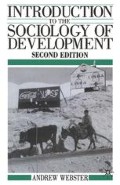Abstract
In the preceding chapter we considered the theory that global modernisation could be explained primarily in terms of the development of certain values, norms and motivations — such as the drive for high achievement. Among those who cultivate such modernising attitudes, it is claimed, are the entrepreneurs of the business world who use the monetary surplus accumulated through wise and steady investment to expand industry and so generate more investable surplus for further expansion. Thus, countries which have yet to develop, lack the necessary values-system and entrepreneurial skills to invest any surplus remaining after people’s immediate consumption needs have been met. We saw that this theory has serious weaknesses in terms of lacking supporting evidence and analytical strength. In particular, we concluded that it does not have any conception of the inequalities of power and class conflict that for many social scientists are an important and for some the most important factor influencing the pattern of social change and development. While modernisation theory has its origins in the Durkheimian and Weberian explanations of industrialisation, those who regard class conflict as a central dynamic of historical change trace their ideas back to the nineteenth century work of Karl Marx.
Preview
Unable to display preview. Download preview PDF.
Bibliography
G. Adam (1975) ‘Multinational Corporations and Worldwide Sourcing’, in H. Radice (ed.) International Firms and Modern Imperialism (Harmondsworth: Penguin).
C. Ake (1981) A Political Economy of Africa (Nigeria: Longman).
S. Amin (1976) Unequal Development (New York: Monthly Review Press).
D. Apter (1988) Rethinking Development: Modernisation, Dependency and Postmodern Politics (Newbury Park: Sage).
A. M. Babu (1981) African Socialism or Socialist Africa? (London: Zed Press).
D. Booth (1985) ‘Marxism and development sociology: interpreting the impasse’, World Development, vol. 13, 7.
T. J. Byres (1979) ‘Of neo-populist pipe-dreams: Daedalus in the Third World and the myth of urban bias’, Journal of Peasant Studies, vol. 6, no. 2, pp. 210–44.
M. Caldwell (1979) The Wealth of Some Nations (London: Zed Press).
P. Cammack et al. (1988) Third World Politics: a Comparative Introduction (London: Macmillan).
F. H. Cardoso (1979) Dependency and Underdevelopment in Latin America (Berkeley: University of California Press).
T. Dos Santos (1973) ‘The crisis of development theory and the problem of dependence in Latin America’, in H. Bernstein (ed.) Underdevelopment and Development (Harmondsworth: Penguin).
D. Ernst (1981) Restructuring Industry in a Period of World Crises (Vienna).
J. Fielden (1836) The Curse of the Factory System (London).
D. K. Fieldhouse (1967) The Theory of Capitalist Imperialism (London: Longman).
A. G. Frank (1967) Capitalism and Underdevelopment in Latin America (New York: Monthly Review Press).
A. G. Frank (1969) Latin America: Underdevelopment or Revolution (New York: Monthly Review Press).
A. G. Frank (1981) Crisis: In the Third World (London: Heinemann and New York: Monthly Review Press).
A. G. Frank (1984) Critiaue and Anti-Critiaue (London: Macmillan)
A. G. Giddens (1985) The Nation State and Violence (Cambridge: Polity Press).
N. Girvan (1976) Corporate Imperialism (New York: Monthly Review Press).
D. Gordon (1988) ‘The global economy’, New Left Review, 168.
G. Kay (1975) Development and Underdevelopment: A Marxist Analysis (London: Macmillan).
G. Kitching (1982) Development and Underdevelopment in Historical Perspective (London: Methuen).
E. Laclau (1971) ‘Imperialism in Latin America’, New Left Review, 67.
V. I. Lenin (1966) Imperialism, The Highest Stage of Capitalism (Moscow: Progress Publishers).
C. Levinson (1980) Vodka-Cola (London: Gordon & Cremonesi).
A. Lipietz (1982) ‘Towards global Fordism? Marx or Rostow?’, New Left Review, 132.
A. Lipietz (1987) Mirages and Miracles: The Crisis of Global Fordism (London: New Left Books).
M. Lipton (1977) Why Poor People Stay Poor (London: Temple Smith).
N. Long (1977) An Introduction to the Sociology of Rural Development (London: Tavistock).
K. Marx (1976) Capital, vol. 1 (Harmondsworth: Penguin).
M. Mann (1986) The Sources of Social Power (Cambridge University Press).
K. Nkrumah (1965) Neo-Colonialism: the Last Stage of Imperialism (London: Nelson).
P. O’Brien (1975) ‘A critique of Latin American theories of dependency’, in I. Oxaal et al. (eds) Beyond the Sociology of Development (London: Routledge).
J. Petras (1969) Politics and Social Forces in Chilean Development (Berkeley: University of California Press).
P. Raikes (1988) Modernising Hunger (London: James Currey).
W. Rodney (1972) How Europe Underdeveloped Africa (Dar es Salaam: Tanzania Publishing House).
I. Roxborough (1979) Theories of Development (London: Macmillan).
R. Sandbrook and J. Arn (1977) The Labouring Poor and Urban Class Formation (Montreal: McGill University Centre for Developing Area Studies).
R. Stavenhagen (1973) ‘Changing functions of the community in underdeveloped countries’, in H. Bernstein (ed.) Underdevelopment and Development (Harmondsworth: Penguin).
G. Therborn (1979) ‘Caudillos and elections’, New Left Review, 113–14.
I. Wallerstein (1979) The Capitalist World Economy (Cambridge University Press).
W. Warren (1980) Imperialism, Pioneer of Capitalism (London: New Left Books).
G. P. Williams (1978) ‘Imperialism and development’, World Development, 6, 7/8, pp. 925–36.
Copyright information
© 1990 Andrew Webster
About this chapter
Cite this chapter
Webster, A. (1990). Theories of Underdevelopment. In: Introduction to the Sociology of Development. Palgrave, London. https://doi.org/10.1007/978-1-349-20584-4_4
Download citation
DOI: https://doi.org/10.1007/978-1-349-20584-4_4
Publisher Name: Palgrave, London
Print ISBN: 978-0-333-49508-7
Online ISBN: 978-1-349-20584-4
eBook Packages: Palgrave Social & Cultural Studies CollectionSocial Sciences (R0)

